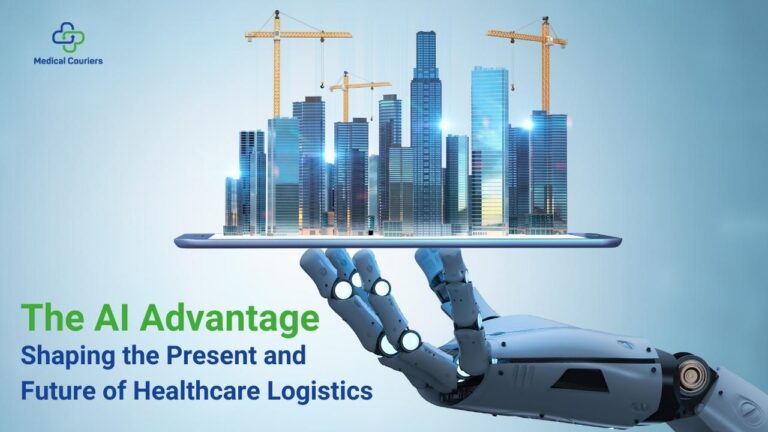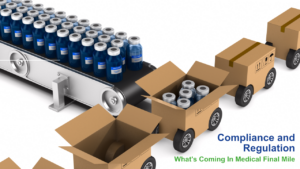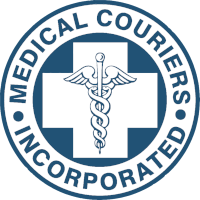Five decades ago, when MCI entered the world of medical logistics, the idea of artificial intelligence (AI) in an ecosystem responsible for saving human lives seemed like a distant reality.
Flash forward to the present day – AI in healthcare is here. As it turns out, the advantages of AI dovetail perfectly with the goals of healthcare logistics providers. Companies are adopting AI to streamline manual workflows, optimize routes, forecast demand, and enhance real-time tracking visibility. It allows them to deliver sensitive cargo timely and securely while enabling healthcare practitioners to focus on what matters most – saving lives.
Today, we explore how AI is transforming healthcare logistics and making it more efficient, resilient, and future-friendly.
7 Ways AI is Revolutionizing Healthcare Logistics
The fault lines of the healthcare sector became exposed during the COVID-19 pandemic. With things relatively under control and the global economy rebounding, now is the time for companies to carry out AI-powered digital transformations to improve the quality of patient care.
Here are seven reasons why healthcare logistics companies are embracing AI with arms wide open:
1 – Making Warehouses Smarter
According to Deloitte’s Future of Goods Movement Survey, warehouse robotics is one area where logistics providers are making significant investments. There’s a simple reason for that: many tasks in a warehouse are repetitive in nature. Packaging, sorting, piece picking, pallet moving, emptying shipper containers, and stacking loose boxes are all very doable by robotics.
If automated intelligently, AI will make material handling and warehouse operations smarter, more efficient, and more cost-effective while freeing the staff to perform more complex tasks. That being said, the critical nature of packages in healthcare warrants the highest level of supervision and care. So, even the smartest facility needs strong human oversight to operate flawlessly.
2 – Executing Touchless Deliveries of Patient Samples
In 2019, UPS announced a groundbreaking service in partnership with Matternet, a leading autonomous drone technology company, to transport medical samples via drones. The service claims to fulfill on-demand and same-day deliveries with the highest efficiency and lower costs, thanks to the drone’s ability to avoid roadway bottlenecks.
The project is underway at WakeMed Raleigh in North Carolina and is supervised by the FAA and North Carolina DoT. However, compared to warehouse automation, the level of investment in last-mile delivery drones is relatively low. Well, at least for now.
3 – Better Demand Forecasting and End-to-End Transparency
Out of the many challenges the pandemic brought, tackling supply shortages and surging demand was major. By using historical trends from past operations and time series analysis, sophisticated AI-driven tools can create highly accurate predictive models to plan for seasonal demand surges and maintenance issues. It can also be leveraged to optimize staff loads and reduce driver churn. Plus, with greater supply chain visibility, logistics companies can spot and fix chronic problems they never knew existed.
4 – Efficient Fleet Management With AI and IoT
AI and the Internet of Things (IoT) are helping companies make better-informed decisions and paving the way for innovations in healthcare logistics. One such use case involves fleet management. When applied together, AI and IoT can improve cost savings, efficiency, manageability, and visibility of the entire fleet.
With the help of IoT, AI can utilize data from telematic devices (think GPS, dash cams, and sensors), fuel consumption, and driving patterns to not only predict but also automate the maintenance schedule of the entire fleet, train drivers on safe driving, and optimize routes for maximum efficiency.
5 – Order Placement Through Conversational AI in Healthcare
Home healthcare is gaining prominence, and with it, we expect medical courier volume to grow exponentially. It is the right time to explore AI-powered tools to make order management as efficient and error-free as possible.
With the help of voice recognition technology, AI-enabled virtual assistants can converse and help with order placement, send receipts, and share tracking status. While this conversational AI is making giant headways in food logistics, it has yet to find its footing in the healthcare domain.
6 – Real-Time Analytics to Avoid Disruptions
Real-time shipment visibility is vital to effective logistics operations, especially with packages like cell and gene therapies requiring specialized handling. This is where technologies like AI, IoT-based telematics analytics, and machine learning come into the picture. These cutting-edge technologies help logistics providers monitor the entire lifecycle of a shipment, audit transactions in real-time, identify risks, and intervene to rectify issues.
7 – Sustainable Operations and Optimized Routes
Zeroing down the shortest route from point A to point B is not challenging at all. Inefficiencies arise when medical transport involves multiple destinations, shifting flight schedules, customer preferences, and different vehicles with varying capacities. AI and machine learning algorithms can help enable a standardized, streamlined network with optimized delivery routes.
Minimizing waste and fuel consumption is another reason why route optimization is so important. By chalking out routes that reduce the number of miles, transport companies can save a lot of fuel, thereby lowering their greenhouse gas emissions.
How MCI is Embracing AI in Healthcare
When done right, AI can potentially increase business profitability by an average of 38% by 2035. However, the adoption of AI technologies alone will not help. According to health experts around the world, while AI has the potential to revolutionize healthcare, there are downsides to jumping full steam ahead too quickly. Between the potential for the loss of jobs and the fact that AI isn’t (yet) capable of understanding social determinants of health, the AI revolution may not be completely safe right now.
We think for AI to truly transform how we operate, it needs an agile, data-driven culture that values technological innovations, prioritizes their clients’ wellbeing, and invests in up-skilling staff. At MCI, our patient-centric culture is inextricably linked with technology and innovation. Investments in cutting-edge solutions have helped us meet our client’s evolving needs and deliver life-saving therapies and home health care to patients. Which is why we think we are ready for AI-enabled transformations.
It is an exciting time for us as we embrace and envision our future in an increasingly AI-powered world. Reach out to us to learn how we can add value to your business.











